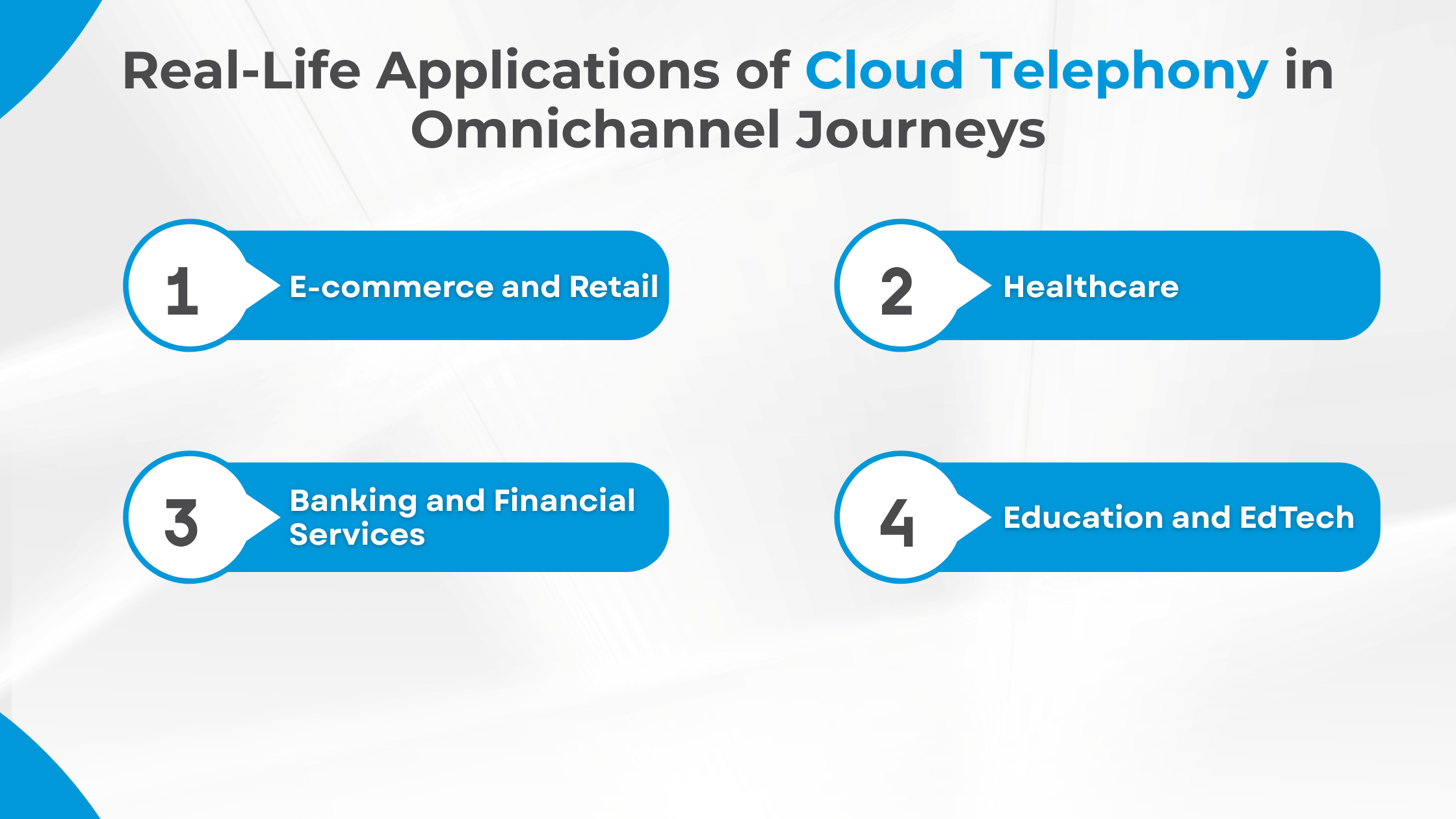How Cloud Telephony Enhances Omnichannel Customer Experience
In today’s hyper-connected business world, customers expect brands to meet them where they are, whether that’s on a phone call, email, live chat, or a messaging platform. The demand for seamless, personalized, and consistent experiences across all channels has fueled the rise of omnichannel communication strategies. At the heart of this shift lies cloud telephony, a technology that has completely redefined how businesses engage with their customers.
In India, where digital adoption is accelerating rapidly, the use of Cloud Telephony Solutions in India is no longer just an option but a necessity for companies seeking to stay competitive. Organizations across industries, banking, e-commerce, healthcare, education, and startups, are increasingly turning to the best cloud telephony providers in India to streamline their customer interactions.
This blog explores how Kommuno’s cloud telephony enhances the omnichannel customer experience, why it is crucial for Indian businesses, and how organizations can leverage it to build stronger, more customer-centric communication ecosystems.
Understanding Cloud Telephony in the Context of Omnichannel
Cloud telephony is a voice communication technology hosted on the internet. Unlike traditional phone systems that rely on complex hardware and infrastructure, cloud telephony routes calls and messages through the internet, enabling businesses to manage customer interactions from anywhere.
When integrated into an omnichannel framework, cloud telephony acts as a backbone that unifies various touchpoints. Customers may begin their journey with a brand through a website chat, continue via a phone call, and later receive a follow-up email, all without losing continuity. Cloud telephony ensures every interaction is tracked, recorded, and contextualized, so the customer feels valued and understood.
For Indian businesses, this integration is especially powerful. The diversity of the market, with multiple languages, regional preferences, and communication habits, demands a flexible system that can support seamless, personalized experiences at scale.
Key Ways Cloud Telephony Enhances Omnichannel Experience

1. Unified Customer Engagement Across Channels
In a traditional setup, phone calls, emails, and chats often operate in silos, making it hard to maintain a consistent customer experience. With cloud telephony, all these interactions can be unified into a single platform.
For instance, if a customer initiates a support query via a call and later follows up over WhatsApp, the agent can instantly view the history of that customer’s communication across channels. This reduces repetition, speeds up resolution, and strengthens trust.
2. Personalized Communication at Scale
Cloud telephony with Kommuno integrates with CRMs and customer databases, giving agents access to complete profiles and interaction histories. This allows them to address customers by name, reference past purchases, or tailor recommendations.
In India’s competitive e-commerce sector, for example, this personalization can turn a one-time buyer into a repeat customer. When integrated into an omnichannel setup, customers receive targeted SMS offers, proactive order updates, and timely IVR follow-ups that feel more personal than generic messages.
3. IVR and Smart Routing for Faster Resolutions
An intelligent IVR (Interactive Voice Response) system is one of the most powerful features of cloud telephony. By directing calls to the right department or agent, IVR minimizes customer frustration and ensures quick resolutions.
When combined with an omnichannel approach, IVR data syncs with chatbots, email systems, and agent dashboards. So if a customer abandons a call due to wait times, they can be followed up with an SMS or email offering alternative support options.
4. Seamless Integration with Digital Channels
Omnichannel is about more than just phone calls. It includes chatbots, WhatsApp, social media, email, and live video support. Cloud telephony integrates easily with these channels, ensuring customers can transition smoothly between them.
For example, a bank using a Cloud Telephony Solution in India can allow customers to check account balances through IVR, escalate issues via live chat, and receive confirmations via SMS, all tied together in one consistent journey.
5. Call Analytics and Customer Insights
Cloud telephony provides advanced analytics on call volumes, average handling time, missed calls, and customer sentiment. When integrated with omnichannel platforms, these insights give businesses a holistic view of customer behavior across touchpoints.
This means organizations can spot patterns, identify bottlenecks, and optimize customer journeys. For example, if customers frequently abandon calls after long wait times, companies can proactively shift those conversations to self-service chat or WhatsApp channels.
6. Flexibility for Remote and Distributed Teams
The rise of remote work in India has made flexibility essential. Cloud telephony empowers agents to take calls and manage customer queries from any location with an internet connection.
In an omnichannel model, this ensures that no matter where the agent is, the customer receives the same quality of service. For businesses with multiple branches or distributed call centers, this flexibility keeps communication consistent and reliable.
7. Cost Efficiency and Scalability
Traditional telephony systems require heavy infrastructure investments. In contrast, cloud telephony operates on a pay-as-you-go model, making it cost-effective for startups and enterprises alike.
When scaled into omnichannel strategies, businesses can add or reduce channels as per demand without worrying about massive upfront costs. This agility is particularly valuable in India’s dynamic markets, where customer preferences shift rapidly.
Why Indian Businesses Need Cloud Telephony for Omnichannel Success
India’s customer landscape is unique. It is characterized by diversity in languages, widespread use of mobile phones, and the growing influence of digital-first channels. Here’s why cloud telephony in India is becoming indispensable for omnichannel experiences:
- Mobile-First Market: With the majority of internet access happening on mobile devices, customers expect seamless calling, messaging, and app-based communication. Cloud telephony integrates these effortlessly.
- Multilingual Demands: Businesses often need to support multiple languages to serve diverse customer bases. Kommuno’s Cloud IVRs can handle regional language preferences, ensuring inclusivity and accessibility.
- High Call Volumes: Sectors like e-commerce, healthcare, and fintech experience massive call traffic. Cloud telephony manages these volumes efficiently with features like auto-attendants, call queuing, and smart routing.
- Digital Transformation Push: Indian enterprises, SMEs, and even government bodies are embracing digital-first operations. Cloud telephony fits naturally into this transformation, bridging traditional and digital communication channels.
Real-Life Applications of Cloud Telephony in Omnichannel Journeys

E-commerce and Retail
- Customers receive order confirmations via SMS.
- Support queries start on IVR but can move to live chat for detailed troubleshooting.
- Personalized offers sent over WhatsApp are backed by call follow-ups for high-value customers.
Healthcare
- Patients book appointments through IVR systems.
- Doctors send reminders via automated calls and SMS.
- Omnichannel support allows follow-ups via phone, email, or teleconsultation platforms.
Banking and Financial Services
- Customers verify transactions with automated IVR calls.
- Service requests initiated on calls are tracked across mobile apps and emails.
- Cloud telephony analytics help banks optimize fraud detection and customer service efficiency.
Education and EdTech
- Students receive exam notifications through automated voice calls.
- Admission queries are handled via integrated IVR and live chat.
- Multichannel support builds trust in online education platforms.
Choosing the Best Cloud Telephony Providers in India
Selecting the right partner is crucial for implementing a robust omnichannel strategy. The best cloud telephony providers in India share some common traits:
- Scalable Infrastructure: Ability to handle growing call and message volumes.
- Omnichannel Integrations: Seamless connectivity with CRMs, chat platforms, and marketing tools.
- Data Security and Compliance: Ensuring compliance with TRAI regulations and data privacy norms.
- Multilingual IVR Support: Essential for businesses targeting diverse Indian audiences.
- 24/7 Reliability: Downtime can severely impact customer trust. Reliable providers ensure maximum uptime.
- Analytics and Reporting Tools: Actionable insights into customer behavior and agent performance.
When evaluating providers, businesses should consider not just pricing but also the provider’s ability to support long-term omnichannel strategies.
Future of Cloud Telephony in India’s Omnichannel Ecosystem
As Indian consumers increasingly adopt digital platforms, cloud telephony from Kommuno will continue to evolve. Some trends to watch include:
- AI-Powered Interactions: Integration of AI with cloud telephony will enable predictive routing, sentiment analysis, and intelligent chatbots.
- Video Calling Integration: Beyond voice, video will become a mainstream part of omnichannel experiences.
- Hyper-Personalization: With richer customer data, businesses will deliver more tailored messages and offers.
- 5G Expansion: Faster internet will make cloud telephony even more reliable and responsive.
Conclusion
In an age where customer loyalty depends on seamless and personalized experiences, businesses cannot afford to operate with fragmented communication channels. Cloud telephony bridges this gap by acting as the foundation of omnichannel engagement.
For Indian companies, the adoption of cloud telephony in India is no longer optional; it’s a strategic imperative. By leveraging the right cloud telephony solution in India and partnering with Kommuno, organizations can unify their customer touchpoints, deliver personalized interactions, and create journeys that build trust and loyalty.
As technology continues to advance, cloud telephony will remain the cornerstone of customer communication strategies, ensuring that every interaction, whether by call, SMS, chat, or email, is consistent, contextual, and customer-centric.
